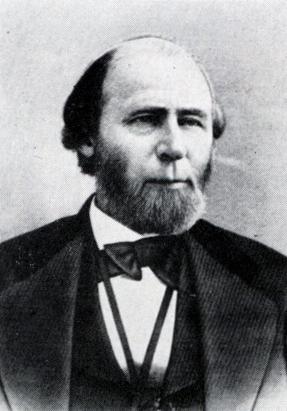Related Research Articles

Adelbert Ames was an American sailor, soldier, businessman and politician who served with distinction as a Union Army general during the American Civil War. A Radical Republican, he was military governor, U.S. Senator, and civilian governor in Reconstruction-era Mississippi. In 1898, he served as a United States Army general during the Spanish–American War. He was the last Republican to serve as the state governor of Mississippi until the election of Kirk Fordice, who took office in January 1992, 116 years after Ames vacated the office.

William Woods Holden was an American politician who served as the 38th and 40th governor of North Carolina. He was appointed by President Andrew Johnson in 1865 for a brief term and then elected in 1868. He served until 1871 and was the leader of the state's Republican Party during the Reconstruction Era.
In the United States, impeachment is the process by which a legislature may bring charges against an officeholder for misconduct alleged to have been committed with a penalty of removal. Impeachment may also occur at the state level if the state or commonwealth has provisions for it under its constitution. Impeachment might also occur with tribal governments as well as at the local level of government.
The Kirk–Holden war was a police operation taken against the white supremacist organization Ku Klux Klan by the government in the state of North Carolina in the United States in 1870. The Klan was using murder and intimidation to prevent recently freed slaves and members of the Republican Party from exercising their right to vote in the aftermath of the American Civil War. Following an increase in Klan activity in North Carolina—including the murder of a black town commissioner in Alamance County and the murder of a Republican state senator in Caswell County—Republican Governor of North Carolina William W. Holden declared both areas to be in a state of insurrection. In accordance with the Shoffner Act, Holden ordered a militia be raised to restore order in the counties and arrest Klansmen suspected of violence. This resulted in the creation of the 1st and 2nd North Carolina Troops, which Holden placed under the overall command of Colonel George Washington Kirk.
The president of the United States is authorized by the U.S. Constitution to grant a pardon for a federal crime. The other forms of the clemency power of the president are commutation of sentence, remission of fine or restitution, and reprieve. A person may decide not to accept a pardon, in which case it does not take effect, according to a Supreme Court majority opinion in Burdick v. United States. In 2021, the 10th Circuit ruled that acceptance of a pardon does not constitute a legal confession of guilt, recognizing the Supreme Court's earlier language as authoritative.

Thomas Whitmarsh Cardozo was an American educator, journalist, writer, and public official during the Reconstruction Era in the United States. He adopted the name Civis as a nom de plume and wrote as a correspondent for the New National Era, founded by Frederick Douglass. He was the first African American to hold the position of State Superintendent of Education in Mississippi.

Alexander Kelso Davis was an American politician. He was a member of the Mississippi House of Representatives and Lieutenant Governor of Mississippi. He was impeached and removed by the resurgent Democrats towards the end of the Reconstruction era in 1876. He was the first African American to serve as lieutenant governor in Mississippi.

Similar to the Congress of the United States, state legislatures can impeach state officials, including governors and judicial officers, in every state except Oregon. In addition, the legislatures of the territories of American Samoa, Northern Mariana Islands, and Puerto Rico have impeachment powers. Impeachment describes the process through which the legislature may bring charges and hold a trial with a penalty including removal from office.
References
- ↑ "Change of Subject: Impeachment of State Officials – a 2004 research report from the office of the Connecticut Attorney General". Chicago Tribune. Retrieved April 16, 2019.
- ↑ "Journal of the Senate of the State of Mississippi: Sitting as a Court of Impeachment, in the Trials of Adelbert Ames, Governor, Alexander K. Davis, Lieutenant Governor, Thomas W. Cardozo, Superintendent of Public Education". Power & Barksdale. April 16, 1876. Retrieved April 16, 2019– via Google Books.
- ↑ "Mississippi History Now – Adelbert Ames: Twenty-seventh and Thirtieth Governor of Mississippi: 1868–1870;1874–1876". mshistorynow.mdah.ms.gov. Retrieved April 16, 2019.
- ↑ Langeveld, Dirk (November 22, 2008). "The Downfall Dictionary: David C. Butler: Nebraska gets off to a rough start". downfalldictionary.blogspot.com. Retrieved April 16, 2019.
- ↑ "Welcome – History Nebraska". history.nebraska.gov. Retrieved April 16, 2019.
- ↑ "Local & North Carolina state news from Raleigh, NC – NewsObserver.com". Newsobserver.com. Archived from the original on May 14, 2007. Retrieved October 25, 2014.
- ↑ Folk, Edgar E. and Bynum Shaw. W.W. Holden: A Political Biography. Winston-Salem: John F. Blair, publisher, 1982. ISBN 0-89587-025-8
- ↑ "N.C. state senate pardons governor who stood up to Klan | Reuters". Reuters.com. April 12, 2011. Retrieved January 10, 2017.
- ↑ "William Woods Holden, 24 November 1818 – 2 November 1892". docsouth.unc.edu. Retrieved January 10, 2017.
- ↑ "Impeachment of State Officials".
- ↑ "Trailblazers of the Reconstruction Era". January 19, 2017.
- ↑ Simmons, William J., and Henry McNeal Turner. Men of Mark: Eminent, Progressive and Rising. GM Rewell & Company, 1887. p428-431
- ↑ "Cardozo, Francis Lewis". scencyclopedia.org. Retrieved April 16, 2019.